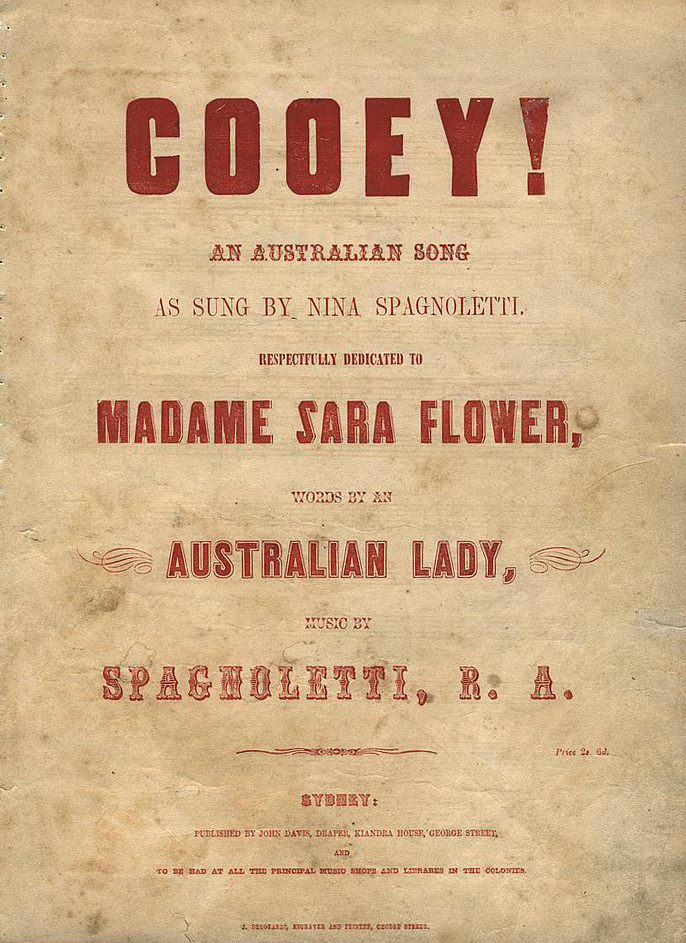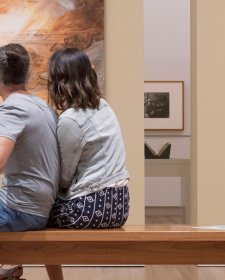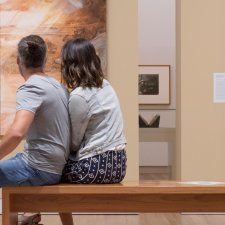Roaming through the bush one day,
He saw a pretty maid.
Her eye was bright as sunshine,
Yet soft as evening shade.
Her look was sad, her gaze was wild, and often did she sigh,
And in a silv’ry, timid voice she uttered the wild cry;
And in a silv’ry, timid voice she uttered the wild cry:
Coo-ey, Coo-ey, Coo-ey, Coo-ey—Echo caught the strain;
Coo-ey, Coo-ey, Coo-ey, Coo-ey—it echoed back again.
Stealing from his hiding place,
He sought to know her fears,
And why she wandered lonely,
And shed those silent tears.
“Alas!” in sport the Nymph replied, “my friends I’ve left behind.
They’re Gipsying within this wood, but where I cannot find;
They’re Gipsying within this wood, but where I cannot find”:
Coo-ey, Coo-ey, Coo-ey, Coo-ey—Echo hears the cry,
Coo-ey, Coo-ey, Coo-ey, Coo-ey—its mocking tones reply.
Seeking then her missing friends,
They rambled as they could,
O’er flow’ry hill and valley,
Through tangled copse and wood.
And since that hour he’s blessed the star, that led the maid to rove.
A trusting heart, a loving wife, he found within the grove;
A trusting heart, a loving wife, he found within the grove:
Coo-ey, Coo-ey, Coo-ey, Coo-ey—Love has caught the strain,
Coo-ey, Coo-ey, Coo-ey, Coo-ey—it whispers back again.
The “Australian lady” who composed these fruity lyrics was none other than Desda— Jane Davies, sometime Messiter (née Price) of Leddicott, Lavender Bay. Her husband, John Davies, had a reasonably successful drapery business at Kiandra House in George Street, Sydney. Mr Davies was Jane Davies’s second husband. The first was Frederic Messiter, whom she married at Balmain in June 1857. Mr Messiter was at one point honorary secretary to the New South Wales Early Closing Association, and was also active in the YMCA. Alas, he died suddenly in February 1860. The following year, Mrs Messiter re-married, to Mr Davies, who had been one of Mr Messiter’s employees—a fleck of detail that might hint at raciness had Davies not been so well respected in draping circles. He was a little more than ten years older than Jane. Settling at first at Woodlands Cottage, St. Leonards, the amalgamated Davies and Messiter families later moved to Leddicott in Lavender Bay, a property that appears to have consisted of pretty well most of McMahon’s Point, North Sydney.
Jane Davies published and performed as a soprano under the charming pseudonym Desda. The music critic of the Sydney Morning Herald went as far as to describe her as “the Australian songstress”. Beautiful though her voice may have been, I am afraid her verses are appalling, and the lyric material rolls off the tongue like a brick. Desda’s sources of inspiration include frustrated love in the bush, the dog nuisance on Sydney’s north shore involving losses of poultry, and the malign influence of lassitude and indolence upon small children. For a while in the late 1850s and early 1860s the Sydney Morning Herald, in which her compositions appeared regularly, thirsted for more. However, the exact nature of Desda’s fruitful, if short-lived association with the composer Ernesto Spagnoletti remains obscure. Mr. Spagnoletti dedicated the printed sheet-music to “Your Willie Has Returned, Dear” (with words by Desda) to “Mrs Messiter”, perhaps out of discretion, though the text rather recklessly tosses the protagonist into the arms of our heroine, Annie, “holding her to his heart”, and “pressing her lips”. Unfortunately this warmth of timbre gradually subsides, and makes way for glacial Church of England pieties. This did nothing to dampen or deflate the buoyant cadences of Ernesto Spagnoletti’s post-Donizettian melody. Desda went on to enjoy comparatively modest success with such gems of colonial bel canto as “Cooey! An Australian Song”, for which Mr Spagnoletti also wrote the music—this was at first vanity-published by Mr Davies himself, a nice tie-in to the draping business; the version you see here was evidently repackaged to meet a different set of circumstances. The remainder of Desda’s oeuvre includes “The Relief of the Distressed”, which is all about poverty and why it is best avoided; a scarifying instructional children’s story called The Rival Fairies, and a patriotic song simply entitled “Australia”, which appeared in the Sydney Morning Herald on Wednesday, August 29, 1860. Desda died at Leddicott on May 25, 1890, aged fifty-three.
According to the excellent Australian National Dictionary, coo-ee originated as an Aboriginal cry, first recorded in 1790, when it was heard among Dharuk speakers in the neighbourhood of Port Jackson.














